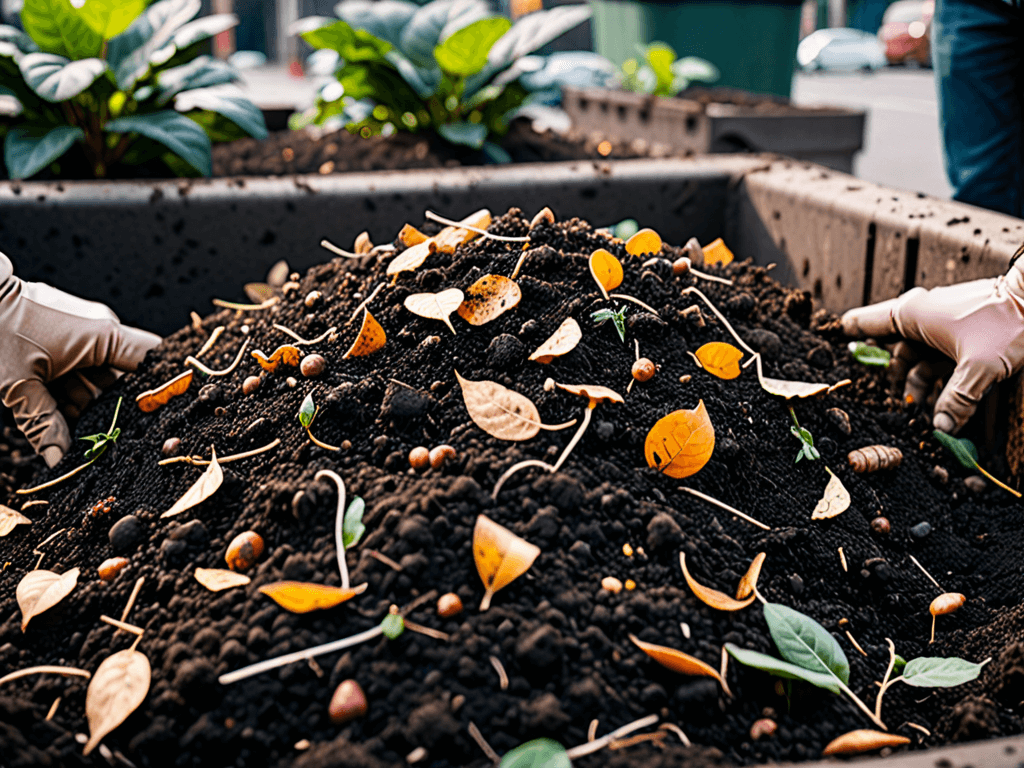Urban composting is transforming how city dwellers recycle waste. By converting organic waste into rich, useful soil, urban environments can become more sustainable and eco-friendly.
This guide dives into the benefits, methods, and tools of urban composting, highlighting its importance in creating a greener future.
Explore how you can start urban composting today and join a growing community committed to environmental stewardship.
What is Urban Composting?
Urban composting is a method of recycling organic waste in city environments, turning food scraps, garden clippings, and other biodegradable materials into nutrient-rich soil.
This practice helps reduce landfill waste and decreases greenhouse gas emissions, addressing urban waste challenges.
To start, you can use small compost bins that fit on your balcony or kitchen counter, utilizing worms or aerobic bacteria to accelerate decomposition.
With a basic understanding of the process and the appropriate tools, you can significantly minimize your home’s waste while producing a valuable resource for urban gardening.
Implementing urban composting not only benefits the environment but also contributes to sustainability efforts in densely populated areas.
Benefits of Urban Composting
Urban composting offers numerous advantages for city dwellers looking to reduce their environmental footprint. By turning organic waste into valuable compost, households can enhance soil quality in community gardens or home planters.
This practice also decreases the volume of waste sent to landfills, which can help lower municipal waste management costs. Moreover, urban composting aids in reducing greenhouse gas emissions by preventing methane production from decomposing organic material in landfills.
It encourages a circular waste cycle, fostering community engagement and awareness about sustainable living practices. People participating in urban composting often find a deeper connection with the natural process of recycling nutrients back into the earth.
How to Start Urban Composting
Starting urban composting is an exciting step towards sustainable living. Begin by choosing the right type of compost bin for your space, whether it’s a small kitchen caddy or a larger outdoor tumbler. Consider using vermicomposting, which involves worms, perfect for indoor environments. Ensure a balanced mix of green materials, like fruit scraps, and brown materials, such as dried leaves, for effective decomposition. Aerate the compost regularly to maintain healthy bacteria levels. Keep it moist but not too wet, resembling a damp sponge. With time, you will produce rich compost that can nourish your plants, while also reducing kitchen waste.
Essential Tools for Urban Composting
To begin urban composting effectively, several essential tools can make the process simpler and more successful.
A sturdy compost bin or tumbler helps contain waste and facilitate aeration, which is crucial for the breakdown of materials.
Using a small indoor compost bin can be practical for kitchen scraps, especially in apartments.
For maintaining the right moisture balance, consider a moisture meter.
Compost thermometers are useful to monitor temperature, ensuring the compost stays active.
Aeration tools, like compost turners or forks, help mix the compost, introducing necessary oxygen.
Worms are essential for vermicomposting, an indoor-friendly method.
Balancing carbon and nitrogen ratios requires a clear understanding of what materials to include, so having a guide or compost chart can be incredibly helpful.
These tools and resources ensure a smooth composting process, turning waste into rich, valuable soil.
Common Mistakes in Urban Composting
Avoiding common mistakes in urban composting can lead to a more successful and efficient process. One frequent error is not maintaining the proper balance of green and brown materials. An excess of one over the other can lead to odor issues or slow decomposition.
It’s crucial to turn the compost regularly to provide oxygen, yet many neglect this step, resulting in anaerobic conditions. Overwatering the compost is another mistake, as it should be kept just moist, akin to a damp sponge.
Failing to chop materials into smaller pieces can extend the composting time since smaller pieces break down faster. Finally, placing the compost bin in a shaded or highly exposed area can disrupt the ideal temperatures for decomposition. By recognizing and addressing these missteps, urban composters can efficiently produce nutrient-rich compost while minimizing inconveniences.
Sustainability and Urban Composting
Urban composting plays a vital role in promoting sustainability in densely populated areas. By transforming organic waste into nutrient-rich soil, communities can reduce their reliance on chemical fertilizers, thus benefiting the environment.
This process supports the natural cycle of nutrients, reinforcing the soil’s health and productivity. Moreover, urban composting helps lower the carbon footprint by reducing the waste sent to landfills, which in turn decreases methane emissions, a potent greenhouse gas.
Encouraging local participation in composting initiatives fosters environmental awareness and responsibility. Implementing composting programs in schools and community centers can educate people about sustainable practices, instilling environmentally conscious behaviors.
Through urban composting, cities can achieve significant progress towards greener, more sustainable environments.
Urban Composting Tips for Beginners
Starting urban composting can be rewarding with a few simple tips.
Begin by choosing a suitable compost bin for your space, ensuring it has proper ventilation to allow air circulation.
For a balanced compost, use a mix of green materials, like fruit peels, and brown materials, such as dried leaves.
Chop materials into smaller pieces to speed up decomposition and keep the compost moist, similar to a damp sponge.
Turn the compost regularly to aerate it, preventing bad odors and promoting healthy breakdown.
Remember to avoid adding meat or dairy products, as they can attract pests.
Keeping a small container in your kitchen for scraps makes it convenient to collect compostable material throughout the day.
By following these simple tips, beginners can efficiently start their composting journey and contribute positively to the environment.
Case Studies: Successful Urban Composting
Successful urban composting projects across the globe highlight how effective waste management can transform urban settings.
In New York City, a community garden implemented a composting program that reduced neighborhood waste by 30%, turning food scraps into rich soil used for planting vegetables and flowers.
In San Francisco, an initiative involved local schools, teaching students about composting while managing cafeteria waste effectively.
This educational approach increased awareness and participation, leading to city-wide positive environmental impacts.
In Tokyo, residents of a high-rise apartment complex started a rooftop composting system, converting kitchen waste into compost that supported an urban vegetable garden providing fresh produce for the community.
Each case demonstrates the potential of urban composting to conserve resources and build a sense of community through sustainable practices.
Conclusion: Embracing Urban Composting
Urban composting offers a simple yet impactful way to address waste management and contribute to environmental sustainability.
Implementing effective composting practices not only reduces landfill waste but also enriches soil, supporting local agriculture and greenery.
By learning from successful case studies and adopting basic composting tips, city residents can actively participate in preserving natural resources and improving their urban environments.
Ultimately, urban composting fosters a community-focused approach, encouraging sustainable living practices that benefit both people and the planet.
FAQ – Frequently Asked Questions about Urban Composting
What is urban composting?
Urban composting is the process of converting organic waste into valuable compost within urban settings to reduce waste and improve soil quality.
How can I start composting in a small apartment?
You can use a compact composting bin or try vermicomposting with worms, which can easily fit in small spaces like under the sink.
What materials can I compost?
Compostable materials include fruit and vegetable scraps, coffee grounds, eggshells, dried leaves, and shredded paper. Avoid composting meat, dairy, or fatty foods.
How do I maintain the compost bin to avoid odors?
Ensure your compost is balanced with equal parts of green and brown materials, keep it aerated, and avoid excess moisture to prevent odor issues.
What are the benefits of urban composting?
Urban composting reduces landfill waste, decreases greenhouse gas emissions, and creates rich soil for gardening, enhancing urban sustainability.
How can I encourage community involvement in composting?
Organize workshops, involve schools, and create community composting sites to educate and engage local residents in composting efforts.


